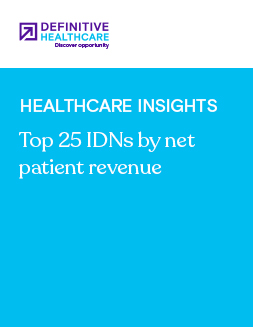Healthcare Insights
Most prescribed medications for patients with rare diseases
Rare diseases, while individually affecting a small number of patients, collectively pose a significant global health burden. Estimates suggest more than 400 million people worldwide live with a rare disease, with researchers identifying about 8,000 distinct conditions.
Orphan drugs, or drugs developed for rare diseases, can provide a critical lifeline for rare disease patients with limited treatment options. By analyzing prescription claims data, we can gain crucial insights into orphan drug utilization and the broader rare disease market. In this Healthcare Insight, we use the Atlas All-Payor Claims dataset to explore the most prescribed medications used to treat various rare conditions.
What is the market for rare disease drugs?
The market for orphan drugs is relatively steady, driven by scientific advancements, regulatory incentives like the Orphan Drug Act, and overall prescription drug market growth. While the development and commercialization of orphan drugs come with unique challenges, the potential for high returns and significant impact on patient lives make this an attractive sector. In 2023, more than half of the FDA’s Center for Drug Evaluation and Research (CDER) new drug approvals were orphan-designated.
How many medications have received FDA orphan drug designation?
The Orphan Drug Act, enacted in 1983 by the U.S. Congress, offers various incentives to encourage the development of treatments for rare diseases. From 1983 to 2022, 6,340 orphan drug designations were granted, representing drug development for 1,079 rare diseases. Top therapeutic areas for orphan drug development include oncology, neurology, and infectious disease.
What medications are prescribed to patients with rare diseases?
Medications prescribed for rare disease treatment often include a mix of specialized treatments, like orphan drugs, developed specifically for rare conditions and more commonly used drugs that address symptoms or associated health issues.
What are the most common drugs for patients with rare diseases?
For this analysis, we reviewed data across six rare disease diagnoses: cystic fibrosis, malignant neoplasm of the pancreas, multiple sclerosis, myasthenia gravis and other myoneural disorders, myelodysplastic syndrome, and narcolepsy. We then reviewed drugs prescribed to these patients using the Atlas All-Payor Claims dataset. The tables below show our list of rare diseases with the highest share of patient prescriptions and list the top medications prescribed to those patients in CY 2024.
| Rank | Drug name | % of prescriptions | Explore dataset |
|---|---|---|---|
| 1 | TRIKAFTA | 5.44% | Explore |
| 2 | CREON | 3.69% | Explore |
| 3 | PULMOZYME | 3.26% | Explore |
| 4 | AZITHROMYCIN | 2.54% | Explore |
| 5 | SODIUM CHLORIDE | 2.43% | Explore |
| 6 | ALBUTEROL SULFATE | 2.41% | Explore |
| 7 | ALBUTEROL SULFATE HFA | 2.33% | Explore |
| 8 | ZENPEP | 1.64% | Explore |
| 9 | OMEPRAZOLE | 1.54% | Explore |
| 10 | PREDNISONE | 1.40% | Explore |
Fig. 1 Data from the Atlas All-Payor Claims dataset. Commercial claims data is sourced from multiple medical claims clearinghouses in the United States and updated monthly. Data accessed May 2025.
Cystic fibrosis (CF) is a progressive, genetic disease that primarily affects the lungs and digestive system. Common medications for patients with CF include Trikafta (targets the defective CFTR protein caused by the genetic mutation), Pulmozyme (helps thin mucus buildup in the lungs), and Creon (provides digestive enzymes).
| Rank | Drug name | % of prescriptions | Explore dataset |
|---|---|---|---|
| 1 | PANTOPRAZOLE SODIUM | 2.36% | Explore |
| 2 | CREON | 2.34% | Explore |
| 3 | OXYCODONE HCL | 2.04% | Explore |
| 4 | GABAPENTIN | 1.98% | Explore |
| 5 | ATORVASTATIN CALCIUM | 1.93% | Explore |
| 6 | ELIQUIS | 1.72% | Explore |
| 7 | AMLODIPINE BESYLATE | 1.57% | Explore |
| 8 | LEVOTHYROXINE SODIUM | 1.47% | Explore |
| 9 | HYDROCODONE-ACETAMINOPHEN | 1.41% | Explore |
| 10 | OMEPRAZOLE | 1.39% | Explore |
Fig. 2 Data from the Atlas All-Payor Claims dataset. Commercial claims data is sourced from multiple medical claims clearinghouses in the United States and updated monthly. Data accessed May 2025.
Common medications for patients with pancreatic cancer include pantoprazole sodium (used to treat too much acid in the stomach), Creon® (used to improve food digestion), and Oxycodone HCL (used to treat moderate to severe pain).
| Rank | Drug name | % of prescriptions | Explore dataset |
|---|---|---|---|
| 1 | GABAPENTIN | 3.28% | Explore |
| 2 | BACLOFEN | 2.37% | Explore |
| 3 | ATORVASTATIN CALCIUM | 2.02% | Explore |
| 4 | LEVOTHYROXINE SODIUM | 1.70% | Explore |
| 5 | DULOXETINE HCL | 1.55% | Explore |
| 6 | HYDROCODONE-ACETAMINOPHEN | 1.29% | Explore |
| 7 | AMLODIPINE BESYLATE | 1.25% | Explore |
| 8 | OMEPRAZOLE | 1.22% | Explore |
| 9 | PANTOPRAZOLE SODIUM | 1.15% | Explore |
| 10 | TRAZODONE HCL | 1.13% | Explore |
Fig. 3 Data from the Atlas All-Payor Claims dataset. Commercial claims data is sourced from multiple medical claims clearinghouses in the United States and updated monthly. Data accessed May 2025.
Multiple sclerosis (MS) is a chronic, inflammatory disease that affects the central nervous system (CNS), which includes the brain, spinal cord, and optic nerves. Some of the most common prescriptions for patients with multiple sclerosis include gabapentin, an anticonvulsant used to relieve pain for conditions of the nervous system, and baclofen, which helps relax muscles and relieve spasms, cramping, and tightness caused by multiple sclerosis.
| Rank | Drug name | % of prescriptions | Explore dataset |
|---|---|---|---|
| 1 | PYRIDOSTIGMINE BROMIDE | 3.00% | Explore |
| 2 | PREDNISONE | 2.56% | Explore |
| 3 | GABAPENTIN | 2.29% | Explore |
| 4 | ATORVASTATIN CALCIUM | 2.14% | Explore |
| 5 | LEVOTHYROXINE SODIUM | 1.90% | Explore |
| 6 | AMLODIPINE BESYLATE | 1.48% | Explore |
| 7 | PANTOPRAZOLE SODIUM | 1.43% | Explore |
| 8 | OMEPRAZOLE | 1.29% | Explore |
| 9 | LOSARTAN POTASSIUM | 1.17% | Explore |
| 10 | LISINOPRIL | 1.15% | Explore |
Fig. 4 Data from the Atlas All-Payor Claims dataset. Commercial claims data is sourced from multiple medical claims clearinghouses in the United States and updated monthly. Data accessed May 2025.
Myasthenia gravis (MG) is a chronic autoimmune disease that weakens voluntary muscles. Pyridostigmine bromide, used to improve muscle strength, represents the highest share of prescriptions among patients with myasthenia gravis.
| Rank | Drug name | % of prescriptions | Explore dataset |
|---|---|---|---|
| 1 | ATORVASTATIN CALCIUM | 2.32% | Explore |
| 2 | LEVOTHYROXINE SODIUM | 2.16% | Explore |
| 3 | GABAPENTIN | 1.90% | Explore |
| 4 | PANTOPRAZOLE SODIUM | 1.90% | Explore |
| 5 | FUROSEMIDE | 1.79% | Explore |
| 6 | AMLODIPINE BESYLATE | 1.74% | Explore |
| 7 | METOPROLOL SUCCINATE | 1.51% | Explore |
| 8 | ELIQUIS | 1.46% | Explore |
| 9 | PREDNISONE | 1.36% | Explore |
| 10 | ACYCLOVIR | 1.31% | Explore |
Fig. 5 Data from the Atlas All-Payor Claims dataset. Commercial claims data is sourced from multiple medical claims clearinghouses in the United States and updated monthly. Data accessed May 2025.
Myelodysplastic syndrome (MDS) is a group of bone marrow disorders that affect blood cell production. Patients with myelodysplastic syndrome most commonly take atorvastatin calcium (for high cholesterol) and furosemide (used to treat fluid retention, swelling, and high blood pressure).
| Rank | Drug name | % of prescriptions | Explore dataset |
|---|---|---|---|
| 1 | DEXTROAMPHETAMINE-AMPHETAMINE | 2.67% | Explore |
| 2 | MODAFINIL | 2.38% | Explore |
| 3 | GABAPENTIN | 1.99% | Explore |
| 4 | ATORVASTATIN CALCIUM | 1.60% | Explore |
| 5 | LEVOTHYROXINE SODIUM | 1.58% | Explore |
| 6 | ARMODAFINIL | 1.52% | Explore |
| 7 | DULOXETINE HCL | 1.27% | Explore |
| 8 | DEXTROAMPHETAMINE-AMPHET ER | 1.23% | Explore |
| 9 | OMEPRAZOLE | 1.22% | Explore |
| 10 | PANTOPRAZOLE SODIUM | 1.17% | Explore |
Fig. 6 Data from the Atlas All-Payor Claims dataset. Commercial claims data is sourced from multiple medical claims clearinghouses in the United States and updated monthly. Data accessed May 2025.
Narcolepsy is a neurological sleep disorder that affects the brain's ability to regulate sleep-wake cycles. The top drug used by patients with narcolepsy is modafinil, a non-amphetamine central nervous system (CNS) stimulant used to treat excessive daytime sleepiness caused by certain sleep disorders.
Learn more
Healthcare Insights are developed with data and analytics from the Definitive Healthcare platform. Want even more rare disease news? Check out our survey results from our rare disease study or start a free trial now.


